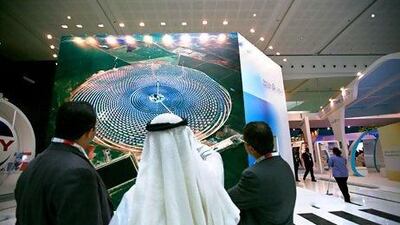Presidents, oil executives and climate change negotiators are today set to descend on Abu Dhabi for this week's flurry of high-profile conferences aimed at the Middle East and global energy markets.
Among their goals at the series of energy events will be pitching for oil concessions, winning solar-panel contracts and recruiting emerging economies to the Abu Dhabi-basedInternational Renewable Energy Agency (Irena), the world's only international organisation for renewables.
The Argentine president Cristina Fernández de Kirchner, Queen Rania of Jordan and the French president François Hollande are among the dignitaries slated to touch down in the capital for the World Future Energy Summit clean energy exhibition and related events that start on Tuesday. Mr Hollande is to be flanked by Christophe de Margerie, the chief executive of the oil major Total, as France seeks to maintain its 74-year presence in the emirate's oil production regime amid a tender for new partners.
On the sustainability front, speakers include thinkers on poverty such as the American economist Jeffrey Sachs and Liu Qi, the vice minister of China's National Energy Administration. China is also sending a large delegation to today's meeting of Irena, the United Nations organisation headquartered in Abu Dhabi that promotes solar, wind and other sustainable power.
Irena hopes China will be next to join the 160-strong organisation, along with other powerful countries such as Russia, Canada and Brazil.
"We've been working hard on getting [China] on board," said Frank Wouters, Irena's deputy director general. "That's at the moment the largest market and one of the biggest producers, and of course it's important to have that."
This year's conferences come at a time when the future of the renewables sector hangs in the balance.
On one hand, major industrial emitters such as oil companies and chemical manufacturers are increasingly putting a public priority on supporting efforts to combat climate change. Ipieca, an oil industry organisation based in London that examines environmental issues, has watched its membership numbers double from 22 in 1974 to 51 today.
"We have no other planet to move to," said Hege Marie Norheim, the senior vice president for corporate climate at Statoil, Norway's state oil company. "We realise that our products are part of the problem, but we also think we are part of the solution."
On the other hand, conglomerates such as Siemens have decided to exit the solar business in recent months, while clean-technology manufacturers are expected to continue falling to a wave of bankruptcies and consolidation that began in the United States in 2011 and is spreading to China. The upside is that pain for manufacturers means markets such as Abu Dhabi, with an ambitious 7 per cent target for renewables in the next decade, can get more for the dirham.
"It makes the payback return on investments much more interesting," said Karel de Winter, the division manager for the supplier Alsa Solar Systems in the UAE. "Everything becomes more feasible with a decreased tariff cost."
Masdar, Abu Dhabi's renewable energy company, yesterday published its first sustainability report. Masdar received an A+ rating for its disclosure of sustainability indicators ranging from economic and environmental data tolabour practices and human rights information. The report was verified by a third-party auditor, Masdar said.

